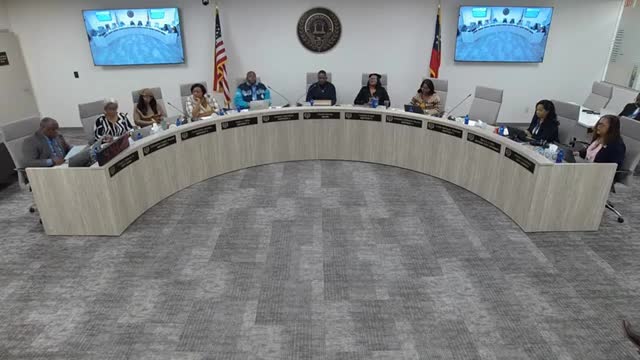South Fulton council discusses campaign sign enforcement; attorney warns changes require ordinance amendment
Get AI-powered insights, summaries, and transcripts
Subscribe
Summary
Council members aired concerns that the city's campaign-sign enforcement has been overly punitive, proposed a 45‑day grace period and a 10‑foot setback from the right of way, but the city attorney said a change must be made by ordinance and cited U.S. Supreme Court and state election law.
City of South Fulton council members debated the city's campaign sign enforcement during a special-called meeting on Oct. 20, with several councilmembers urging changes to avoid what they described as disenfranchising voters and disadvantaging candidates.
Councilwoman Helen Z. Willis pressed for clearer rules after reporting complaints that campaign signs had been removed from precincts and private property. Willis proposed a motion to suspend portions of the existing sign ordinance and to implement a 45‑day grace period before and after elections, with the additional requirement that signs be placed at least 10 feet from the right of way and not affixed to traffic-control signs.
"I don't want to be known if this city is being more punitive than other cities, disenfranchising voters," Councilwoman Willis said, describing constituent complaints that signs were removed even at polling places.
Mayor Pro Tem Linda Pritchett and other councilmembers said the presence of signs at precincts helps inform voters and described instances where poll managers or precinct staff have removed signs. Pritchett said better communication with election supervisors and poll managers is needed so legal campaign signs are not removed. Councilwoman Keisha B. Bell raised a specific local example at Flat Shoals Library where the boundary between library and school property created confusion about where signs were permitted.
City Attorney Kelly told the council that substantive changes cannot be made by suspending the ordinance and must be enacted through an ordinance amendment. Kelly also cited governing legal limits: the U.S. Supreme Court's Reed decision on content-based restrictions on signs and the state statute that prohibits posting campaign material within 150 feet of a polling-place building or within 25 feet of a voter standing in line. "The Supreme Court ... stated, and I quote, 'innocent motives do not eliminate the danger of censorship presented by a facially content based statute,'" Kelly said, summarizing the Reed ruling and reminding councilmembers to apply the same standards to all categories of signs.
Kelly also cautioned about municipal liability when signage in the right of way creates hazards and referenced an earlier case the city has monitored. The attorney advised that any policy change must be consistent with both federal and state law and that the existing ordinance contains no mechanism to suspend enforcement as Willis proposed.
After discussion and a second, Willis withdrew her motion and asked staff to draft an ordinance that would return to council for formal amendment. "I withdraw my motion. I will ask that you bring that ordinance back so that we can follow," Willis said. No ordinance amendment was adopted at the meeting; councilmembers instructed staff to prepare language for a future meeting.
Council members and staff asked that any proposed amendment treat all signs consistently to avoid the content-based limits identified in the Reed case, to clarify setbacks from rights of way and traffic-control devices, and to coordinate guidance for poll managers and precinct officials for early voting and election-day operations.
